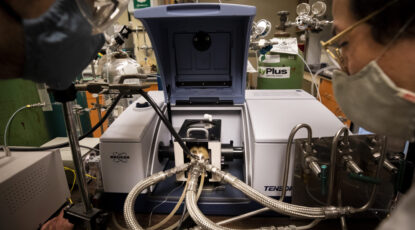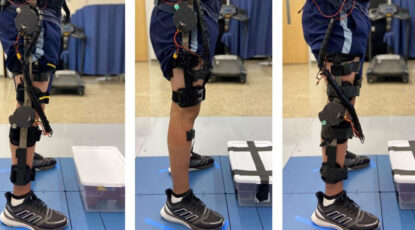Science and Technology
-
U-M, Humotech partner to bring open-source bionic leg to research labs
First released in 2019, the open-source leg’s free-to-copy design is intended to accelerate scientific advances by offering a unified platform to fragmented research efforts across the field of bionics.
-
$30M gift to establish the Ronald Weiser Center for Prostate Cancer at Michigan Medicine
The center will be a clinically focused entity within the Rogel Cancer Center that combines expertise from three departments — Urology, Radiation Oncology and Radiology — with representatives from each discipline collaborating and serving in leadership roles.
-
In the digital era, you are not alone
Solitude traditionally has been defined as being physically separated from other people. But as the world becomes increasingly mediated, it’s time to rethink what ‘being alone’ really means.
-
$2M to replace fossil fuels with solar power in fertilizer production
U-M researchers will study the effectiveness of a new ammonia production process aimed at reducing greenhouse gas emissions. Bringing the process directly to farmers could cut environmental costs by reducing transportation requirements.
-
Energy from waste: Cow-inspired biodigesters
A proposed energy-production system based, in part, on cow stomachs could generate 40 percent more power from municipal waste streams, at a 20 percent reduced cost — and provide a viable alternative to sending waste to landfills.
-
Exoskeletons to assist workers, the elderly, etc.
U-M is developing a solution for the one in eight Americans who faces a mobility disability. A $1.7 million grant from the National Institutes of Health is funding the creation of a modular, powered exoskeleton system that could be used on one or multiple joints of the legs.
-
Individual finger control for advanced prostheses demonstrated in primates
In a first, a computer that could fit on an implantable device has interpreted brain signals for precise, high-speed, multifinger movements in primates. This is a key step toward giving those who have lost limb function more natural, real-time control over advanced prostheses.
-
Solar cells with 30-year lifetimes for power-generating windows
A new transparency-friendly solar cell design could marry high efficiencies with 30-year estimated lifetimes, which may pave the way for windows that also provide solar power. The high-efficiency but fragile molecules for converting light to electricity thrive with a little protection.
-
Dementia’s toll on US
U-M study shows major gaps in who gets care that could help them remain at home. Black, low-income, or people with lower levels of education are less likely than their counterparts to have available spouse caregivers, but more likely to have adult children available to provide care.










